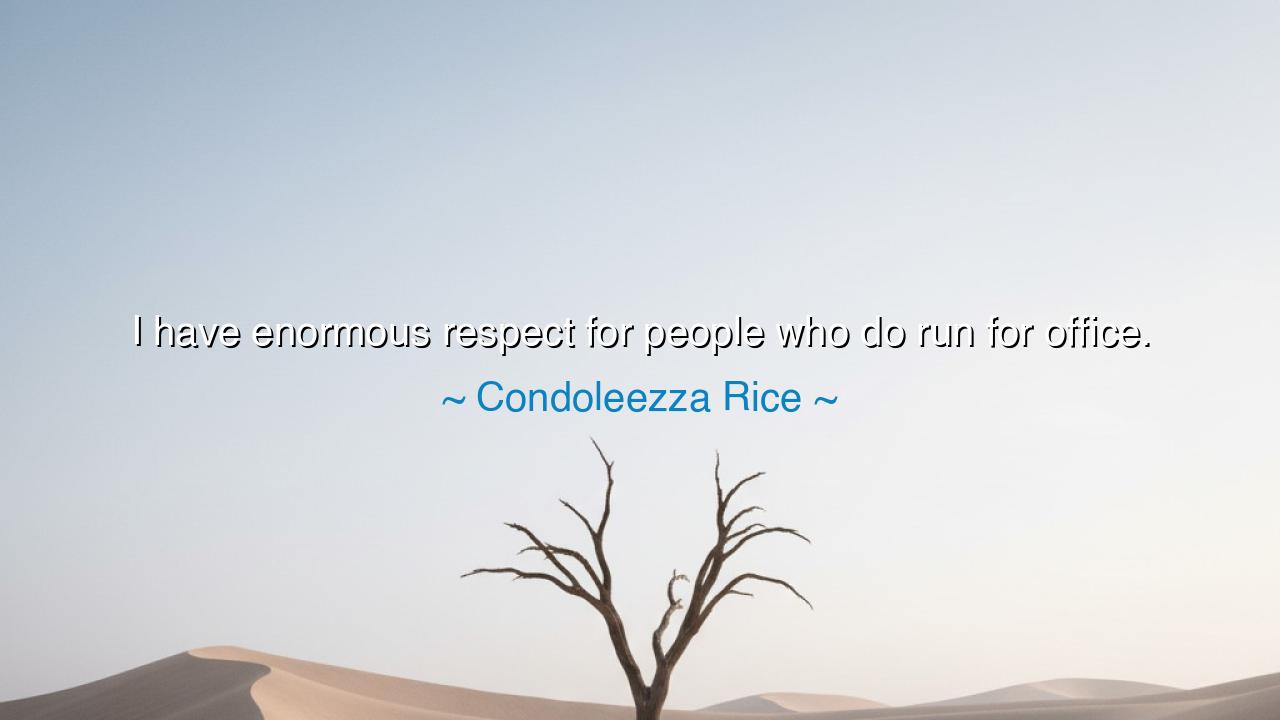
I have enormous respect for people who do run for office.






Hearken to the words of Condoleezza Rice, whose admiration pierces to the heart of civic courage. She declares that she holds enormous respect for people who do run for office, recognizing that to step forward into public service is to assume a burden both noble and perilous. In this statement lies a timeless truth: leadership is not merely a reward of ambition, but a calling fraught with scrutiny, sacrifice, and the weight of collective trust. Those who pursue it step into the arena of responsibility, where their choices ripple through the lives of many.
Since antiquity, societies have revered those who embrace the duties of governance. In the city-states of Athens, citizens who sought public office faced not only the honor of decision-making but also the judgment of peers and the consequences of error. To run for office was to expose oneself to public examination and to accept the gravity of responsibility. Rice’s words echo this ancient understanding: the act of standing for office is itself an expression of courage, integrity, and devotion to the common good.
Consider the life of Cicero, the Roman statesman and orator, who repeatedly entered the political fray despite personal danger and political turmoil. His eloquence and intellect were weapons, yet the trials he faced—conspiracies, exile, and ultimately death—reveal the peril inherent in public service. Like Cicero, those who run for office today must navigate both admiration and criticism, bearing the hopes and grievances of their constituents while maintaining personal honor. Rice’s respect is rooted in this acknowledgment of the moral and practical burdens of leadership.
To pursue office is to confront not only external challenges but the inner trials of character. One must balance ambition with humility, principle with pragmatism, and vision with action. In this, the courage to run becomes a mirror of the soul, reflecting dedication to something greater than oneself. Those who endure campaigns, public scrutiny, and the relentless demands of service display a fortitude and resilience worthy of admiration. Rice’s statement reminds us that respect is due not only to success but to the willingness to serve.
History offers further lessons. Abraham Lincoln, who faced repeated defeats before ascending to the presidency, exemplifies the valor of persistence and commitment to the public good. His willingness to endure personal, political, and social trials demonstrates that the act of running for office itself is an expression of courage and vision. Rice’s respect mirrors this acknowledgment: one honors the act of stepping forward, regardless of immediate triumph or failure.
For the citizen, this insight carries moral and practical weight. Recognize that those who run for office assume burdens that affect the lives of many; respect their dedication and engage thoughtfully with their ideas. Support those who embody principled courage, and reflect upon the responsibilities inherent in self-governance. Rice’s words are not merely admiration—they are a call to awareness and participation in the processes that shape society.
Practical guidance emerges from this reflection: cultivate civic knowledge, understand the responsibilities of leadership, and if moved by conviction, consider service yourself. Whether in local councils, boards, or national offices, the willingness to run represents a profound commitment to the collective well-being. By respecting this act, we honor both the individual and the ideals of civic life.
Thus, heed the wisdom of Condoleezza Rice: to enter the contest of governance is a courageous act, demanding integrity, resilience, and vision. Let this inspire admiration for those who serve and aspiration within ourselves, that we too may engage in the noble pursuit of public good, carrying forward the enduring flame of civic duty and responsibility for generations yet to come.






AAdministratorAdministrator
Welcome, honored guests. Please leave a comment, we will respond soon